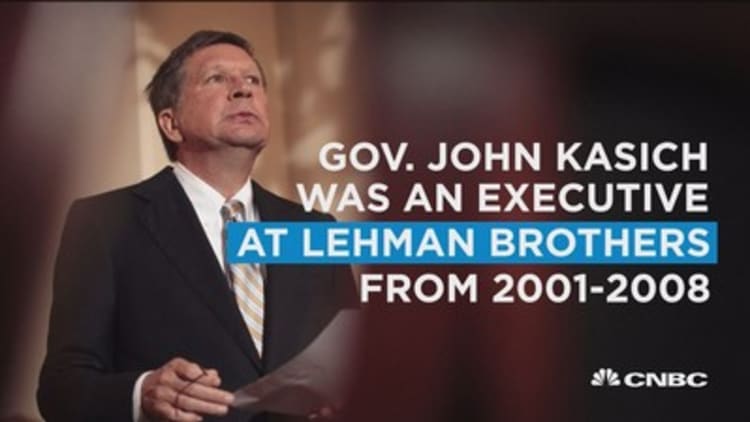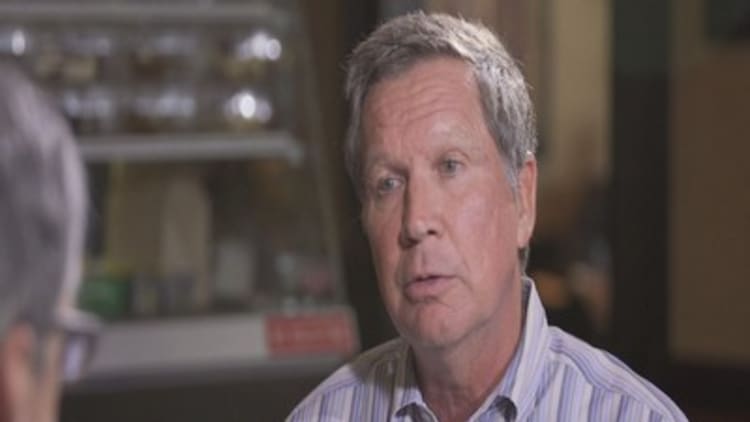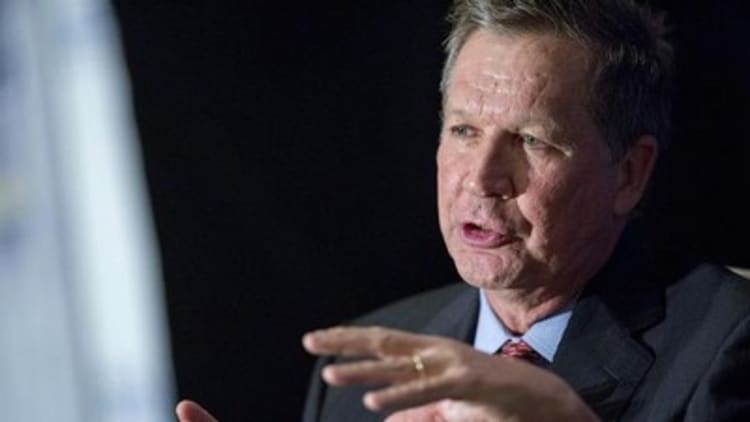



Republican Ohio Gov. John Kasich, 63, who is expected to formally enter the presidential race next week, will bring one of the most distinctive profiles to the contest, having expanded Medicaid under provisions of President Barack Obama's health-care law while prodding his party to do more for the poor.
Before winning the governorship, Kasich represented Ohio in the U.S. House, where he chaired the Budget Committee at a time when congressional Republicans reached a balanced-budget deal with then-President Bill Clinton. After a brief and unsuccessful bid for the 2000 Republican presidential nomination, Kasich hosted a TV program for Fox News and worked as a Lehman Brothers executive.
He sat down with me in Westerville, Ohio, at the Monte Carlo Italian Kitchen, where he participates in a regular Bible study group. What follows is a condensed, edited transcript of our conversation:
Economic growth is not an end unto itself. It's a means to an end, where everybody gets lifted. If you're drug addicted, mentally ill, working poor, developmentally disabled, we want everybody to have a place—if you're a member of the minority community. Is that an odd Republican position? No, I think it was the way that Reagan looked at things.Ohio Gov. John Kasich
HARWOOD: When you see the Republican Party as it exists today, do you like what you see?
KASICH: I have my own definition of what I think we should be doing. For me, we need to move out of just the defines of party and move into what it means to be totally committed to America before we worry about party.
Economic growth is not an end unto itself. It's a means to an end, where everybody gets lifted. If you're drug addicted, mentally ill, working poor, developmentally disabled, we want everybody to have a place—if you're a member of the minority community. Is that an odd Republican position? No, I think it was the way that Reagan looked at things.
HARWOOD: Do you think your party has gotten too ideologically rigid?
KASICH: No, I think we have a mixture. Because if that was true, we wouldn't be getting done what we're getting done in Ohio. Washington is not the center of my universe. So when I travel around the country, I find that people are very open to what I have to say about all fronts.
Sometimes people say, "Well, you know, Kasich's not a conservative." Well, balanced budgets, cut taxes by more than anybody in the country, I have a history of doing that. But I also think that we have to reach out to people who live in the shadows. I don't know that everybody gets it.
When I look at the Old and the New Testament, there's one thing that is clear in there. And that is, it does depend on how we help people who are downtrodden, down on their luck, hurting, the widowed, the poor.
HARWOOD: What you did on Medicaid—a lot of people in your party say, "That's growing government. That's growing entitlements."
KASICH: It's money we send from our state of Ohio to Washington that I was able to bring back. And we take that money and we use it to help the mentally ill get on their feet. Why are we putting people who have mental illness and locking them up in prison?
There are more people in the country who are sitting in jails and prisons than in psychiatric hospitals. And these are people that, you know, on the proper medication, can get their lives back. So if they're in jail, they cost us $22,500. If they get their lives back, they can do remarkable things to benefit society. I would prefer that.
If you're drug addicted—80 percent of the people in our prisons in Ohio have some sort of substance abuse. You can put them in prison, and then not treat them, and let them get out, meet the drug dealer on the corner, and end up back in prison at $22,500 a year. Or you can try to rehab them. We have found that as we treat the drug addicted in our prisons, when they come out, the recidivism rate is 10 percent, which is stunning and remarkable. Overall, we have a healthier society.
Read More10 questions for Nancy Pelosi
HARWOOD: And you think you can defend that position with Scott Walker in a debate, Ted Cruz or somebody else.
KASICH: I'm not worried about defending anything. This is what I'm for. We don't want the working poor spending all their time getting health treatment when they're sick or in the emergency room of hospitals. Because guess who pays for that? We all do. So if we can get them care and help them to stop being the working poor and to keep working, but not be poor, then we're solving a big problem. This is what I believe. It's worked in Ohio. It's pulled us together.
Republicans and Democrats, I think, fundamentally, overwhelmingly believe that we shouldn't put the mentally ill in prison. They don't think we should put the drug addicted in prison without treating them so they can get their lives back, so they don't come out and break into our homes. They don't think that we should send all the working poor into an emergency room.
So when you talk about Republicans, you've got to figure out who you're talking about. Don't define what Republicans think by just the handful of elected officials. The Republican Party is people who call themselves Republicans. There are more and more Republican governors, even when you're talking about that, who are getting their toes in the water—and some of them sneaking into the water—to do exactly what we're doing here.
HARWOOD: A bunch of your colleagues have, as you have, embraced the Common Core educational standards. But now that some of them are in the race for president, they've flipped, and they have disavowed those. Why does that happen, and why have you not disavowed them?
KASICH: We did not have the kind of high standards that I thought we needed in Ohio. So what we're doing in our state is, we are driving high standards and then the curriculum to achieve those high standards is being driven by local school boards with parental advisory.
I want Ohio students to be driven towards the top, to get the most out of their ability. I'm not backing off. Why would I back off high standards and local control? I'm not going to be reading the minds of others. You figure that out. That's what you get paid for as a reporter and an analyst.
Read More 10 questions with Bernie Sanders
HARWOOD: What did you learn from working with Fox News? Any insights about the way the country is divided?
KASICH: I just had a great time, absorbing tremendous amounts of information in a very short period of time, and then doing a show and then having to wait for my ratings. It was very, very challenging. What I liked about it is it really pushed me intellectually.
There is polarization in the country, and I think we need to end it. I can tell you, no one ever told me how to do my job. I'm an independent guy. If you watch [Bill] O'Reilly, he's a very independent guy. What the media does is, they try to figure out how to get good numbers and do reporting.
My sense is that we've been just divided because people have emphasized more their own party, their own ideology. But it has to end.
The element of greed is bad. But Wall Street's an essential part of the United States and global economy. So when the issue of greed is limited with good leaders, it works fine. When the greed factor goes high, then I think mistakes get made.Ohio Gov. John Kasich
HARWOOD: At Lehman Brothers, what did you learn about Wall Street, the financial sector?
KASICH: I traveled all over the country, and I was really involved in trying to help companies to be more successful. I worked in a lot of different industries. It was a fantastic experience to see the way CEOs think, the way the boards of directors work.
There is an element of greed on Wall Street that is not good. The best of them say, "I don't need to get a deal to make money." I'm going to advise a company to do the best it can, to be able to compete in the global marketplace. The people I associated with had that philosophy.
There are some people there who would advise a company to do something that wasn't in their best interest because if a company does something, that banker would get paid. The element of greed is bad. But Wall Street's an essential part of the United States and global economy. So when the issue of greed is limited with good leaders, it works fine. When the greed factor goes high, then I think mistakes get made.
HARWOOD: No big Wall Street bankers went to jail. Does that strike you as wrong?
KASICH: If there's something to prosecute somebody for, you prosecute them. But if you don't have something to prosecute them for, then you don't prosecute them. It's not like the system was rigged.
Just because you do something that's greedy that can end up in failure doesn't mean you committed a crime. But you know what? There's a judgment that comes later, about how many people get hurt. And frankly, that's a pretty tough judgment, in my opinion.
Our problem in Washington is not a revenue problem. It is a spending problem, and an unwillingness to take on special interests and an unwillingness to deal with the tough politics.Ohio Gov. John Kasich
HARWOOD: We've got the prospect of some sort of a long-term budget deal. Do you think, in the situation we find ourselves in, that a deal doing something about entitlements and the rest of the budget will require revenue?
KASICH: I can't answer that. I don't know that. I would not presume that you have to have revenue.
Our problem in Washington is not a revenue problem. It is a spending problem, and an unwillingness to take on special interests and an unwillingness to deal with the tough politics.
Most people know that the $18 trillion (debt) is not sustainable over time. So we've got to sit down with Republicans and Democrats and see if we can get them to realize the problem, put the country first, their own party second, and solve a problem. And in terms of what all that is going to look like, I kind of know what I what I think we need to do. I mean, I've been there before.
Read More 10 questions for Mitch McConnell
HARWOOD: Are you willing to take the Norquist pledge not to raise any taxes? Will you be running under that pledge?
KASICH: I don't know. You're trying to get me way in the weeds, and I'm not going there. I'm not prepared to roll this stuff out. And you know what? I'm not sure when I'm going to be prepared to roll it out.
I think that I and the team around me have the bona fides to be able to fix a lot of financial things. And going into the weeds with specific details that can become fodder for political intrigue is not something I'm particularly interested in.
The best way to know what somebody's going to do is on the basis of what they've done in the past. And we've been able to do a lot of good things to innovate, improve government, create economic growth, both in Washington and here in Ohio.


